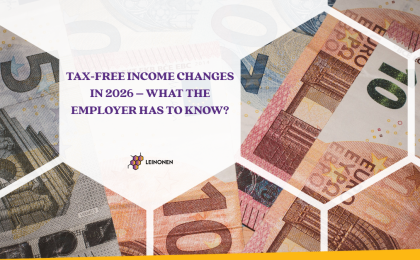INCOME TAX
Maximum daily allowance increased
- The tax exempt limit of daily allowances during assignments abroad is 50 euros for the first 15 days of an assignment abroad.
- At most for 15 days per calendar month. It is still 32 euros for each following day.
- Until now, any money paid over the maximum was taxed as a fringe benefit, but from 2016 onwards it is regarded as salary.
Income from rent defined in the Income Tax Act
- The Income Tax Act defines income from rent as rent, consideration for constitution of right of superficies and tolerating a real encumbrance, and other consideration received for tolerating a restriction on the use of an object arising from law or transaction.
- Income from rent does not include:
- bearing accessory expenses for the purposes of § 292 of the Law of Obligations Act and duties for the purposes of § 293 on behalf of the recipient of income from rent or compensating the recipient of income from rent for bearing them;
- Pursuant to clause 19 (3) 15) of the Income Tax Act, payment made for tolerating utility networks and utility works to the extent of the land tax paid on the land related to the obligation to tolerate.
Income tax incentive related to natural person’s apartment rent
- For the purposes of the Law of Obligations Act, 20% is deducted in the tax return from the rent received on the basis of a residential lease contract to cover the expenses related to rental.
- The deduction applies to resident natural persons, non-residents and contractual investment funds.
- This deduction is not applied to sole proprietors.
- This deduction applies to all taxable persons irrespective of the amount of expenses incurred and the existence of documentary evidence.
- The amount of deduction is not limited.
- In the case of income from rent, income tax is still withheld from payouts, which means that deduction is not considered during the withdrawal stage, but only upon the submission of a natural person’s tax return.
Tax exempt income
- 2016 2040 per year 170 per month
- 2017 2160 per year 180 per month
- 2018 2280 per year 190 per month
- 2019 2460 per year 215 per month
Additional tax exempt income of pensions increased
- 2700 per year (up to 225 euros per month)
- (a pension of 395 euros is exempt from tax)
Training expenses
- The income tax incentive on expenses related to hobby training for adults was abolished with an amendment.
- The right to deduct expenses related to formal education and the hobby education of persons up to 18 years of age remained unchanged.
- The expenses for the student’s participation in in-service training are considered training expenses if the person conducting the training holds an activity licence for conducting the in-service training or they have submitted a notice of economic activities therefor.
The expenses paid for obtaining a driving licence for driving motor vehicles of:
- category AM;
- category A, sub-category A1 or A2;
- category B, sub-category B1;
are no longer considered training expenses.
If teaching a person to drive is necessary for work or enterprise-related purposes, the expenses paid by an employer for the relevant training of their employees or paid by a sole proprietor to train themselves are still subject to tax exemption.
Limit of gifts and donations
- A limit (5% of income earned in the taxation period) was applied to natural persons until now, but it will be abolished from 1 January 2016.
- As a result of the amendment, gifts and donations became equal to training expenses and housing loan interest from the viewpoint of deductions, to which only the general limits (50% of taxable income, but not more than 1200 euros) are applied.
Restriction on total amount of deductions from income
- The total amount of the restriction on deduction of housing loan interest, training expenses, charitable gifts and donations from income was 1920 euros, but it was reduced to 1200 euros with the amendment.
- The amendment will apply to housing loan interest paid from 2016 onwards and other deductible expenses.
VALUE ADDED TAX
Amendments enforced on 1 May 2016
The list of persons to whom goods or services can be sold at 0% tax, i.e. with a VAT exemption certificate, was extended.
Sale to the armed forces of NATO member states and the civilian staff accompanying them when such forces are taking part in the common defence effort in Estonia.
Sale of goods or provision of services to the headquarters of an international organisation situation in another Member State or to an international military headquarters.
Amendments enforced on 1 May 2016
Sale of goods or services to an international military headquarters situated in Estonia, provided that the relevant incentive is stipulated in an international agreement ratified by the Riigikogu.
Goods and services can be sold to an EU institution located in Estonia when the total cost of the goods or service without VAT is at least 53 euros according to the invoice. This amount can also be smaller in the case of fuel, utility expenses and communication services.
When goods are sold or a service is provided at 0% VAT to an EU institution, NATO armed forces or an international military headquarters located in Estonia, then the certificate is approved by the Ministry of Foreign Affairs or the Ministry of Defence.
Approval of tax-free certificate
The goods exported in the case of tax-free sales to natural persons can be inspected and the tax-free certificate can be approved by the customs or the Police and Border Guard Board.
Long-term cross-border services
In the case of long-term (over a year) cross-border services when the recipient must be subjected to reverse taxation, the turnover is deemed to have occurred on 31 December every year (including the first year of service provision).
Reverse taxation of import
- The terms and conditions of using the special arrangements must be complied with within 12 months before the notification of commencement of the use of special arrangements.
- The tax authority checks the compliance with the terms and conditions within 30 days of receipt of the notification and informs the taxable person whether or not they comply with the terms and conditions.
- If non-compliance with the terms and conditions within the last 12 months is identified during a monthly inspection, the right to use special arrangements can be suspended until the end of the next month.
- During tax proceedings, the right to use special arrangements can be suspended until the completion of the tax proceedings.
- The right to use special arrangements can be annulled on the basis of a written notification of the taxable person or by deleting them from the register of VAT payers.
- The tax authority can annul the right to use special arrangements with a notice of assessment or if the right use them has been suspended for six consecutive months.
The limit of accommodation services increases
The VAT rate on accommodation services and accommodation services with breakfast will increase from 9% to 14% from 2017 onwards.
SOCIAL TAX
The tax rate will be 32.5% (12.5%) from 1 January 2017.




